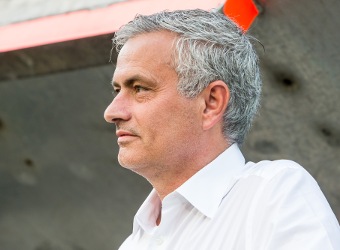Jose Mourinho - defensive or just adaptive ?
 mr3002 / Shutterstock.com
mr3002 / Shutterstock.com
Jose Mourinho’s career so far has been that of a sojourner in football. Fans of opposition clubs have called him several names; from a managerial nomad to a glory hunter, but however you feel about his managerial map, one can’t deny his managerial record.
The name Jose Mourinho first gathered prominence after he led FC Porto to a Primera liga and the UEFA cup in 2003, and then to another Primera liga trophy and Champions League glory in 2004. At Porto, his focus was on combative midfield battles and high-pressure football; his aim was to give opposition players just two options: lose the ball to him, or engage in long and fruitless passing.
Eventually, his midfielders would frustrate opposition players and his attackers would take care of the rest; he was able to win the biggest trophy in European football playing this way. Also, over his two years in charge of the Portuguese side, no club scored more goals than his Porto side, we can hardly call that “defensive” now, can we?
In 2004, Roman Abramovich took him to Stamford bridge, where he led the team to their first league triumph in fifty years and also won the league cup in the process. He also set the record for the highest points ever achieved in the league same season. The next season saw him win another league title while beating England’s biggest clubs in the process.
In his first season in England, his team scored four goals against six different oppositions in just nine games, and scored seventy-two goals at the end of the season. His second stint at the London club also produced a league title in 2014/2015 season.
Thereafter, he moved on to Internazionale where he won the Scudetto in his first season in 2009. The second season saw Internazionale become the first club in Italy to achieve the treble when Jose led them to Copa Italia, Scudetto and UEFA Champions League triumphs.
His next move was to Real Madrid where he broke Barcelona’s domination of the domestic league in his second season in charge, leading the Los Blancos to a league title. His Real Madrid side also scored an average of 108+ goals in his three seasons in charge, outscoring arguably the best Barcelona attack of all time in two of those seasons. His second season also saw his team score 121 goals, a La liga record till date.
Now he is at Manchester United. In his first season, even though he finished sixth on the log, he won the league cup and led his team to Europa League win, qualifying for the Champions League in the process. To a passive observer who only looks at final results and goals scored, Jose Mourinho’s side probably didn’t do much attacking throughout the season, but results and number of goals scored sometimes doesn’t tell the full story. As a matter of fact, Manchester United created more chances than Chelsea, the team that won the league; they were just unlucky with getting the ball in the net
Proper analysis of Jose Mourinho’s side would no doubt show a manager who puts a huge emphasis on defensive solidity. He builds his team from the back, to midfield, and then to attack; and it has consistently worked for him, but calling him a defensive manager would be unfair. First of all, his trophy haul does not show a manager who only stays on the defensive while others do the attacking.
You cannot consistently dominate every league you manage in by just surrendering the initiative to the opposition. His team’s reputation at Chelsea was that of a compact side that mixed defensive solidity with attacking flair. His Real Madrid side was an attacking side with steely and combative midfielders. His Internazionale team was more defensive but that was due to the nature of the league and the kind of players he had available, and his Manchester United side is a combination of all, depending on the opposition.
Jose Mourinho is one of the best at analysing the opposition, and sometimes he realises that perhaps they have far better firepower than his team, and that they would lose more by losing that he would, so he adopts a conservative approach and puts the pressure of attacking on the opposition, while he seeks to hit them on the counter. That does not make him defensive, it simply makes him a pragmatist.